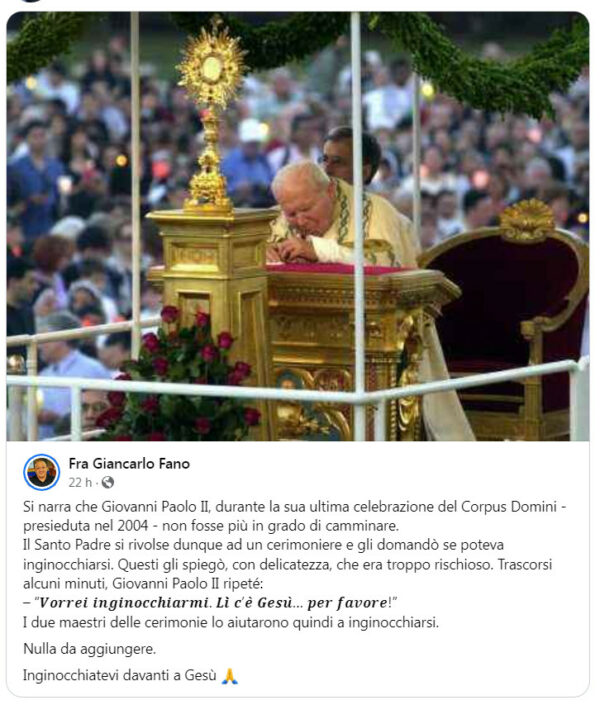This feast marks the closing of the holiday season.
I’ve always appreciated this wholesome, rich experience: a sequence of celebrations that manages to present newer and newer peaks of interest, significant and emotional moments, without tiring.
It all begins with Lent, which is appropriately long: a preparation through acts of penance, which helps your faith grow and adds to the eventual enjoyment of the Easter feast itself.
You get an appetizer with Palms Sunday. Then there’s the Easter Triduum, intense! And then a long Easter time, which even gets a double ending, with Ascension and Pentecost. And even then we’re not done yet! I understand it wasn’t always like that and these traditions may change, but we get two extra holidays in a row: the Solemnity of the Trinity, and the Solemnity of the Body and Blood of Christ, often referred to with its Latin name: Corpus Domini (The Body of the Lord).
Quite a thorough program, tho when it ends children (in general) enter summer vacation mode and disappear. And it’s a pity that adults increasingly think that kind of church stuff is made for and aiming at children, hence they jump at the opportunity to take a long break…
Well, here we are.
Solemnity of the Body and Blood of Christ – Year A

It is said that John Paul II, during his last Corpus Domini celebration in 2004, was unable to walk. The Holy Father then asked one of the Master of Ceremonies if he could kneel. Which then tried to gently explain him how this was too risky. After a few minutes, John Paul II insisted: “I wish to kneel down. Jesus is right there… please!” The two Master of Ceremonies helped him kneel. Nothing to add. Kneel in front of Jesus.
I didn’t know how to approach this topic, the Eucharist, due to its extraordinary importance.
But then inspiration found me.
Sorry if this may sound corny to some of you: we’re crossing bigot territory.
Yes, it’s a bloody Catholic thing. Emotional, simple, humble. This is where we can appreciate one of the facets of the personality of St. John Paul II, which contribute to his greatness: he wasn’t afraid of appearing childish, a prisoner of a naïve faith. He truly believed that Jesus was right there, in front of him. And he took the matter seriously.
Behind this simplicity, behind this request to let him kneel, there is an authentic person. Anyone who’s just pretending, playing a part… however consummate an actor he may be, in the long run will show his true colors; even the idea of making such a scene wouldn’t occur to him.
No, it’s not a façade.
It is in moment of extreme frailty that you can realize a person’s true character, his or her true priorities.
It’s also details like this one that help us sense that JPII’s legacy, in his teachings and through his example, has just begun to bear fruit.
Hooray for the Body!
The greatest intuition that John Paul II had was perhaps that of dedicating so much space and energy to the theology of the body, which teaches the value of our flesh and of the physical world (!) which is essential for the Christian faith (!)… But as a teaching, it’s so deep that it tends to be hard to grasp. It’s a doctrine that can flourish only after society reaches a certain level of development.
In fact A) pre-modern man sees in his body
1. a tool (my strength, a weapon, whatever I can build with it),
2. a vulnerability (my illnesses, death),
3. an object of desire (my woman, sex).
In these three areas the most significant experiences are -above all- brutal.
For B) postmodern man, on the other hand, the body becomes
1. an inadequate means, a limit (reinventing one’s identity, transsexuality);
2. a carcass to get rid of (euthanasia, the escape towards the artificial);
3. a pure instrument of pleasure (unlimited sex, as a consumer product; also getting high: brain under the influence of chemicals).
In these three areas primitive brutality has given way to disdain and disappointment.
Stuck between the mud and the clouds
In the history of thought and human customs there’s this continuous tension between giving in to the call of the flesh, descending towards animal nature, or rejecting it, fleeing towards an impossible purity, which in the end represents a rejection of our very existence, now seen as meaningless: removing, separating, purifying, spiritualizing… eventually you’re left empty-handed, there’s no humanity, nothing to save.
Those that choose (practical) atheism tend to focus on their desires and self-gratification, therefore at first glance you’d say an atheist would gravitate around a single pole, that of brutality; but we’ve seen how in the postmodern society there’s this insane drive to cancel, humiliate, replace the body, or at least feel disgusted by it.
We live in a world that wants to eliminate embarrassment, difficulties and handicap. We can’t stand smells, uncertainties for our genetic future, the aches and pains of old age. We flee sickness and death by running towards euthanasia. Above all, the bodies of others are disgusting and unbearable, when compromised by hunger, deformity, loss of motor functions and sphincter control… Their lives, dependent on others, “not worth living”. We burn corpses as soon as possible, increasingly often also scattering the ashes, to try to remove the thought by eliminating all physical traces. Even the exalted bodies of fitness and porn are just artificial models, opportunities to debase normal bodies, that appear inadequate when compared to an ideal of perfection.
Yes, the Cathars are among us. Through the model of Catharism, which also historically includes the Albigensians, the history of thought is dotted with examples of movements, or aspects of culture, marked by this rejection of the body, of creation, of physical reality.
Even in an apparently contradictory, ambivalent way. Let’s think, for example, of a characteristic trait of the Albigenses, the endura: suicide by starvation, at the end of an alleged path of asceticism. Isn’t this more or less the same thing that happens with the practice of sallekhana (or santhara) in Jainism, the also-ran cousin of Buddhism?
In a sense, the decadent West is conditioned to follow a similar path, gravitating towards suicide and vegetarianism.
But the modernity of Catharism is seen above all in their contempt for pregnancy: a rejection of human existence as such. Accompanied by a surprising exaltation of sex “against nature”: then as now, a sexuality, such as homosexuality for example, which has lost contact with its reason for being, is presented as “superior”.
A partial concession to our most primitive brain, which is focused on pleasure: a seemingly tactical move which is actually pushing in the direction of denying it.
Moreover we can typically find, through various religious traditions, signs of this tension, resolved in one direction or the other, but mitigating the impact through tactical concessions to the opposite drive.
Such is the exemplary case of Buddhism: a philosophy that is unwittingly arbitrary, inconsistent, founded on nothingness, which sets a personal goal in self-annihilation, to to end this . However, here’s the contradictory concession to humanity: in valuing compassion. A sort of necessary compensation, to be more palatable.
But at the end of the day, the charge of nihilism is all in there: it’s a philosophy that denies that the existing world can be seen as good. It seeks to end all this. It’s The Sorrows of Young Werther with extra steps.
It is, however, hardly ever pointed out how Islam represents the perfect opposite example. Here too there are tactical concessions to the opposite drive, in this case instances of asceticism: for example in the deprivations that derive from the obligatory month of fasting, or in the prohibition of sex outside marriage.
But Islam appears to be excellent at titillating our basest instincts, counting on greed and shameful desired, of men that are called to become warriors and plunderers: giving free rein to violence, plunder, rape… In fact, even the reference to sexual continence is more theoretical than anything else, thanks to various exceptions, to their objectifying women, to the right to possess the women of the enemy…
Ramadan fasting is actually imposed only during the day, hence it becomes a perfect excuse for banquets and binge eating during the night… And above all the Promised Paradise is desperately, comically carnal. Even abstaining from alcohol is only temporary, in view of an eternal life where you’re promised you’ll get drunk endlessly…
The only possible proposal: all others pale in comparison
Once viewed through this lens, the ideological and religious movements of this world appear inadequate, incapable of asking the right questions and of giving answers to existential problems. They don’t know how to aim high, or if they do they deny our very nature, causing their path to be pointless or inconsistent.
Oscillating between a rejection of the body and hedonism, as I said. Even in the Christian world there are those who try to cancel the scandal of sexuality and those who are on the contrary very “liberal” on these things (Aunt Ines once told me: “those Catholics are quite sporty on the horizontal”).
But in these cases we’re dealing with abusive phenomena, which don’t represent nor respect the scope of our faith.
Indeed, the Christian answer does not deny the tension between matter and spirit, it overcomes it in an unprecedented synthesis.
The material world does not exhaust our horizon, but neither does it represent a ballast to get rid of.
That’s because there is a God who becomes incarnate, who suddenly gives a new meaning to all of this.
And in Communion, in physical union with the Body of Christ (!) even our miserable bodies find ennoblement. Unbelievable! This is literally one of those occasions where you’d be right to use this exclamation.
No, this is not just a traditional form of religiosity. It does not separate the spirit and the body, indeed it promises its resurrection, albeit in a new form, freed from evil and imperfections.
There can be no equally valid alternative, this is really about squaring the circle.
When people find value in the body, this becomes a well-rounded vision: you learn to love also and above all what is inadequate, imperfect, compromised by illness. In fact, if God who is Perfection finds you good, how can you make differences for someone who, as a creature like you, is perhaps slightly less healthy?
You suddenly understand the bifurcation:
– on the one hand you have the homeless derelicts of Calcutta, reduced to pitiful conditions but lovingly cared for by the nuns of Mother Teresa, as well as those suffering from leprosy or many other horrible diseases, the most painful and deformed cases of Cottolengo, children with Down syndrome, the rejected: they all find in the followers of Christ people who truly love them even in their condition…
– On the other hand, you have those who dream of living in a privileged bubble made up of exclusive parties full of models and jocks; of 5-star resorts, sports cars, fancy clothes, luxurious houses, swimming pools: expecting everything to be impeccable; for a dynamic life, full of opportunities and victories. But even those who more or less succeed… at the end of the day, they’re still unsatisfied, they feel something is amiss, deep down; plus they’ll have to face the inevitable decay of their own bodies. Even if you rush to get help from a cosmetic surgeon, you can only slow down the inevitable; in the process, you easily slip into risible territory, like the pathetic old matrons of Terry Gilliam’s Brazil (1985).
Jesus Christ indicates a different way for those who are not afraid of losing their body, on the contrary! He achieves something immense by exposing himself to violence and oppression; he becomes a victim, putting his body at stake for a noble purpose. He gives meaning to our physical reality in giving himself.
And in a similar way also those who follow him, unworthily. Losing one’s body, giving up on enjoying life, on what is deemed worth living by most, only to eventually get it back again, transformed.
A hundred times more, already in the present…
This is not about throwing away the life we have, in the vague hope of obtaining eternal life in return. No, in fact Jesus says, in Mark 10, 29-30:
“Amen, I say to you, there is no one who has given up house or brothers or sisters or mother or father or children or lands for my sake and for the sake of the gospel who will not receive a hundred times more now in this present age: houses and brothers and sisters and mothers and children and lands, with persecutions, and eternal life in the age to come.”
The ultimate goal is of a different nature, right. But if we choose to lose our life, we will find significantly more pleasures and satisfactions even in our present life! With a side of persecutions? What madness is this? Christian foolishness, once again: reading a few biographies of saints gives us this surprising impression. The life that is given, that one does not keep jealously for himself but becomes an instrument of communion, is not only an admirable life, which projects towards Heaven; it is also richer, a harbinger of deeper satisfactions because it is constructive, because it is based on love. Despite the persecutions.
A form of suffering that you can only try to escape, but cannot escape, is meaningless pain that only causes you anguish. On the contrary, evil endured in the name of love is then overcome and even a source of new value.
Anyone who buys a supercar like a Bugatti, worth a few million euros (over the top, as far as roads to enjoying life are concerned), will regret it the next day, and will not be happy until he resells it (that’s the impression from the testimonies of people who went through this); yet the lesson probably won’t be enough for him. He will not be able to imagine the satisfaction, the sense of fulfillment of one who, nailed to a bed by illness, consciously unites his sufferings with those of the Cross of Christ.
A God who suffers breaks the pattern
In a world made only of ideas, nothing has intrinsic value. And nothing is worth it.
In a world that is only material, is there something of value at all? Disgust prevails.
If, on the other hand, God himself descends to our level and exposes himself to the abuses and attacks on his body, a path opens up to find meaning in what we are and what we can be.
If the Infinite Being is OK with you as you are, he has thought of you like this, he wants to take you by the hand…
And if he wants you to choose him, and that you throw yourself into his arms, so to speak, by your own volition: as a free choice…
And if he even leaves the possibility for you to hurt him (!) , and afterwards he wants to save you all the same, he sacrifices himself for you… (!)
Saint Augustine was really right:
Felix Culpa: O happy fault, which gained for us so great a Redeemer!
Extracting meaning from the act of self-giving, I said: perhaps one of the secrets of creation lies here. The physical, imperfect world exists because it represents an opportunity to bring one’s very existence into play, through vulnerability. A type of value that is characteristic only of things that run the risk of being thrown away; a true love that flows through a choice: it could have been a refusal.
Why the Eucharist
Redemption is concrete: had it only been about promises, abstract concepts, fancy words… That wouldn’t have been enough. A physical act was needed to mark a tangible event involving our body, united in communion with the body of Christ, given in expiation for our sins: analogous to the victim in the sacrifice of the Temple of Jerusalem.
We had to eat the lamb. To participate, to be there, to make it our own.
Even if we wouldn’t have remotely dared to dream of the Eucharist if it hadn’t been gifted to us, well… Looking back, it’s clear now: it is a necessity.
God-with-us cannot remain confined to a doctrine, to a book: an act of incarnation is announced and made present in the flesh, in Communion. Everything is brilliantly consequential.
Well, for this I will never forgive the Protestants. Taking the Eucharist away from their subordinates and followers. A diabolical poverty.
Take everything else, but not the Eucharist! After such an act there cannot be excuses, you are not on Jesus’ side, you are on the side of the world. And of destruction.
Let’s go back to John Paul II: rethinking sexuality
Christianity, if we were to reduce it to a slogan, could be defined as the religion of the body. Perhaps now, after pondering the implications, all of this becomes clearer.
But then… How do you explain the (in)famous sexophobic Church, about which the media have been babbling for decades?
One factor in this may be represented by a real human tendency, acting reflexively: fighting evil is not always done lucidly, even by men of the Church. If I can clearly see the evil that is present in materialism, I may run the risk of slipping into the opposite extreme, rejecting the body. This indeed happened and it was significant.
But the most important reason (for this sexophobic Church meme) lies in the bad faith of the thought leaders themselves: journalists, intellectuals, influencers and important people. Having to justify their debasing themselves, rejecting virtue and embracing vice… they found a natural excuse in blurring the lines that divide sex from debauchery, the call to responsibility from a fear of sex itself.
Especially today, intense and extraordinary falsehoods are peddled when discussing what the Catholic Church actually teaches, but it’s indeed the animosity against the Bride of Christ, by people foaming at their mouth, that is off scale.
Yet there’s another important factor in the spread of the mentioned prejudice, which concerns the development of civilization. For almost all of human history, life has been a struggle for survival. Something we, today, cannot even figure out: we’re unable to put ourselves in their shoes, facing their numerous challenges, since they left us with astounding levels of development and well-being.
It is no coincidence that a more cerebral, detached religiosity, one that rejects the body, has gained traction at all latitudes. If you fear the extinction of our species, if every family expects to see at least one of their children die; if future is uncertain and moving forward requires great effort and responsibility, there’s no time to waste or desire to discuss pleasure; anyone whose primary focus is that of finding pleasure in life is a profiteer who will put on the shoulders of others the burdens that he did not want to shoulder.
The body naturally becomes a dangerous thing, a force to be kept under restraint!
We all needed an in-depth exploration the beauty of life, especially on the subtle and delicate matter of sexuality, but this becomes possible only now, after having overcome such a phase of perennial emergency, which was the norm for humanity.
Sadly… we are imperfect creatures, which in the absence of the right stimulus, tend to slip and become more like animals: for this reason, as soon as the opportunity to appreciate sex and enjoy life is at hand, we typically tend to let go and let our primitive urges control us, not knowing how to find meaning in life; the majority seeks to obtain abundant sex while preventing procreation, decoupling the two; selfishness is the name of the game. The opportunity to mature and build something deep and meaningful is typically thrown away, lost in the general slackening.
For this, a JPII was needed, in order to develop the theology of the body. Coming at the right moment, and personally detached from a reality, that of sex, which he did not despise at all.
It’s a sort of law of nature: in order to understand something deeply, you have to resort to wise people who are definitely not directly involved, but at the same time don’t reject, but indeed appreciate the subject on a higher level, intellectually.
A body communicates; love in the flesh
As a religion of the body, Christianity brings together the value of human frailty and of bodies tainted by (imminent) death; the Eucharist; procreation; sex; these last two things seen as profoundly linked.
– Love as agape, selfless love for one’s brother, has a possible symmetry, in taking care of a body in times of need.
– Loving children, from the point of view of parents, or for God, also needs corporeal facts, hence it’s founded on gestures… but that’s still not enough.
From the bottom up, we always feel inadequate.
– Procreation is parental love made physical reality, even if it is above all the mother who experiences the bodily dimension of procreation, and not only in childbirth.
– The Eucharist is the love of God that becomes physical reality.
From top to bottom, therefore, there is a special love, actualized in the body, that defines our lives.
– Eros, love through an union between equals, finds sex as a necessary bodily actualization.
Sex is the most delicate and difficult issue, not only because of the responsibility inherent in (potentially) having children, but because it brings selfishness into play; it’s empowering your desire to possess; you risk seeing the person you love only as a means to satisfy a burning animal instinct: an instrument of your pleasure. Difficult eh, taming the bull! Yet the toughest battles are those that can bring the most fruitful results, in every sense.
If you’re not a slave to your body drives, and at the same time you don’t reject the flesh, you can reach a deeper maturity.
Precisely those who have renounced having a sexuality, who’ve taken a vow of chastity, can appreciate it in perspective, thus being able to teach others its meaning, and the inherent pitfalls. Like a soldier defending his homeland, a land he never hopes to return to.
Respect the body, help and care for the body in need; enjoy the body; find the pleasure of communion and of participating, as instruments, in the work of creation… Everything fits together.
Corpus Domini
Back to the original topic.
Eucharistic Adoration.
An extra opportunity to meditate on this mystery of God who became flesh and comes to dwell in us, literally.
Oh, worshiping Him, on display on the altar… we who casually eat wafers out of habit, paying little attention…
The opening photo is so catholic!
Be like children, who still know how to experience wonder: rediscovering the mysterious presence of God in a piece of bread, every day.
Truly believing it, that’s the point.
Taking seriously the absurdity of the Creator of all things making himself present right there. You can’t see anything new or strange, on the contrary it looks like your usual bread, albeit a little strange, round and very thin… But those are aspects to be ignored: accidents, details pertaining only to appearance.
Worse yet, he wants to be eaten by you! To get you in union with him!
If the presence of God, right there, was already something incomprehensible and hard to believe… this should make you tremble. We really must say, I must personally say: I am not worthy! I’m not!










































